S.M. White's Blog
November 3, 2014
Breaking Silence
I know this post has been a long time coming . . . and perhaps a bit over do. But as I've been working on writing, revising, and editing four books, along with a handful of short stories, I decided to put marketing and blogging to the wayside and focus more on producing quality work. And while this has hurt my ability to reach out to readers, I assure that it was done with the best of intents. Now, with my books completed, I'll be able to push more weight into getting the word out and hopefully resume building my fledgling fanbase. For those of you taking the time to read this post, I thank you and hope you find my tales worthy of your time. All four of my current releases are now available.
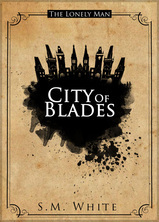 Just released was the second book in my Lonely Man series titled, "City of Blades." This comes more than a year after the first book, "The Witch's Price," was completed. My hope was the put out the three books in the series with as little break as possible, but after starting in on "City of Blades" I realized pretty quickly that the tale was increasing in complexity and would need far more attention than I'd initially assumed. Especially if I wanted to keep the narratives at the length I'd planned.
Just released was the second book in my Lonely Man series titled, "City of Blades." This comes more than a year after the first book, "The Witch's Price," was completed. My hope was the put out the three books in the series with as little break as possible, but after starting in on "City of Blades" I realized pretty quickly that the tale was increasing in complexity and would need far more attention than I'd initially assumed. Especially if I wanted to keep the narratives at the length I'd planned.
My Lonely Man series was intended to be three short, action-driven stories that defined the life of Mhets Sorrowbringer. But, as stories have a habit of doing, it took on a life of its own. It demanded certain confrontations. It begged for deeper philosophical insights. And it refused to be denied crucial revisits to the past . All of which give the story its unique flavor. With this further attention to "City of Blades" the series is now far grander in scope while holding true to my original vision of the three books carrying themselves as succinct and tight narratives. Which is no mean feat. These tales could have easily been expanded upon and the word counts bloated. Yet the length they've held to is fitting. I want these books to be quickly digestible narratives that garner a feeling of breathlessness and strength and scope. I feel this most closely mirrors the character of Mhets Sorrowbringer, and the integration of this concept, I feel, comes across cleanly. I did not want to set out and write a sprawling epic. I wanted a concise story focusing on a single character (told through two viewpoints).
Mhets is an anti-hero down to the definition (and perhaps even skirting the 'hero' part). But while he comes across as a foul and bitter bastard, he holds this small conviction that there's right things to be done in the world, even if on the surface they seem self-serving in their execution. And this is the beauty of Mhets' character. Superficially, he's this man bent on bringing hell where ever he goes, but he also gives hints that there's a softer exterior beneath his impregnable outer shell. This was what I had the most trouble with: that of portraying Mhets as a likable character. I didn't want him to be overtly empathetic, or a character that reader's immediately connect with; I wanted to readers to see deeper into his character, to understand where his pain and his sense of betrayal derives from, and then comes to understand him. This concept was touched upon in "The Witch's Price," and is highlighted in "City of Blades."
Ultimately, Mhets' evolution from villain to hero will culminate in the last Lonely Man novel, "The Chained God." With the release of that final book (some months down the road) I'll talk more about the overall writing process of the series.
If you've been paying attention to the prologues, you'll notice that they're following a linear path across books, highlighting Mhets' defining moments from the past that come around to influence his present day conflicts. Perhaps you can guess at what the opening scene in "The Chained God" might be ...
Thanks for reading.
 Just released was the second book in my Lonely Man series titled, "City of Blades." This comes more than a year after the first book, "The Witch's Price," was completed. My hope was the put out the three books in the series with as little break as possible, but after starting in on "City of Blades" I realized pretty quickly that the tale was increasing in complexity and would need far more attention than I'd initially assumed. Especially if I wanted to keep the narratives at the length I'd planned.
Just released was the second book in my Lonely Man series titled, "City of Blades." This comes more than a year after the first book, "The Witch's Price," was completed. My hope was the put out the three books in the series with as little break as possible, but after starting in on "City of Blades" I realized pretty quickly that the tale was increasing in complexity and would need far more attention than I'd initially assumed. Especially if I wanted to keep the narratives at the length I'd planned.My Lonely Man series was intended to be three short, action-driven stories that defined the life of Mhets Sorrowbringer. But, as stories have a habit of doing, it took on a life of its own. It demanded certain confrontations. It begged for deeper philosophical insights. And it refused to be denied crucial revisits to the past . All of which give the story its unique flavor. With this further attention to "City of Blades" the series is now far grander in scope while holding true to my original vision of the three books carrying themselves as succinct and tight narratives. Which is no mean feat. These tales could have easily been expanded upon and the word counts bloated. Yet the length they've held to is fitting. I want these books to be quickly digestible narratives that garner a feeling of breathlessness and strength and scope. I feel this most closely mirrors the character of Mhets Sorrowbringer, and the integration of this concept, I feel, comes across cleanly. I did not want to set out and write a sprawling epic. I wanted a concise story focusing on a single character (told through two viewpoints).
Mhets is an anti-hero down to the definition (and perhaps even skirting the 'hero' part). But while he comes across as a foul and bitter bastard, he holds this small conviction that there's right things to be done in the world, even if on the surface they seem self-serving in their execution. And this is the beauty of Mhets' character. Superficially, he's this man bent on bringing hell where ever he goes, but he also gives hints that there's a softer exterior beneath his impregnable outer shell. This was what I had the most trouble with: that of portraying Mhets as a likable character. I didn't want him to be overtly empathetic, or a character that reader's immediately connect with; I wanted to readers to see deeper into his character, to understand where his pain and his sense of betrayal derives from, and then comes to understand him. This concept was touched upon in "The Witch's Price," and is highlighted in "City of Blades."
Ultimately, Mhets' evolution from villain to hero will culminate in the last Lonely Man novel, "The Chained God." With the release of that final book (some months down the road) I'll talk more about the overall writing process of the series.
If you've been paying attention to the prologues, you'll notice that they're following a linear path across books, highlighting Mhets' defining moments from the past that come around to influence his present day conflicts. Perhaps you can guess at what the opening scene in "The Chained God" might be ...
Thanks for reading.
Published on November 03, 2014 10:47
June 22, 2014
The Dark Beyond the Door & Novel Revisions
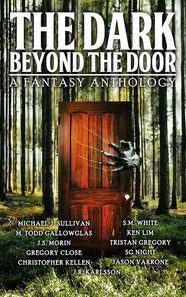 The Dark Beyond the Door The Dark Beyond the Door (£1.78) is an Indie anthology that I'm proud to have contributed to. The host of authors who've taken part in this project is an incredible array of talent that shouldn't be missed. Not to mention that the Indie turned traditionally published author, Michael J. Sullivan, has provided the forward as well as a story of his own to the collection. Needless to say, this is a book all aspiring Fantasy Indie authors should own, if only for the chance to sample what the field is currently producing.
The Dark Beyond the Door The Dark Beyond the Door (£1.78) is an Indie anthology that I'm proud to have contributed to. The host of authors who've taken part in this project is an incredible array of talent that shouldn't be missed. Not to mention that the Indie turned traditionally published author, Michael J. Sullivan, has provided the forward as well as a story of his own to the collection. Needless to say, this is a book all aspiring Fantasy Indie authors should own, if only for the chance to sample what the field is currently producing.A little background on the anthology. The book's theme has to do with a door leading to the unknown. In writing for this concept, my short, The One Who Runs, doubled in length (4,000 words to 8,000) as it was revised in order to fit the door theme. Because of this, I believe the story grew vastly more complex and intriguing from its initial state. There's an interesting process to conforming a completed story to fit with a new theme. And while the door wasn't too difficult a concept to work into the story, it did alter character motivations and relationships to a degree that the story essential became something entirely new.
Not only was revising The One Who Runs an exciting process, but it was a tremendous learning experience that has taught me a lot about stories, about their creation and alteration, and how a story that can be considered finished and complete can become something even better with time. This has led me to return to work on my current novels, The Pale Hand of God, The Dark Arm of God, and The Lonely Man: The Witch's Price, in an effort to make them the very best they can be.
When I began self-publishing in 2012 with The Pale Hand of God, I went the route alone, assuming that my independence as a writer would allow me to produce unfiltered novels that were all my own, and could stand with the very best in the industry. But as time has passed, and I've encountered other writers, I've realized that stories need other eyes, other experiences, and other tastes. Therefore, with my increased financial abilities, I've taken to getting professional input on my stories. From this I hope bring my novels up the level that I know in my heart they're capable of becoming. But I also hope to become educated on many of the areas of my writing that I'm deficient. As much as I'd like to be able to claim that I alone can write, revise, and edit my novels with perfection, I feel it's far more beneficial to be part of a team effort that brings out the best in my writing.
Please enjoy the anthology, and I look forward to getting my books back into your hands.
Published on June 22, 2014 01:44
October 27, 2013
In the Spirit of Halloween
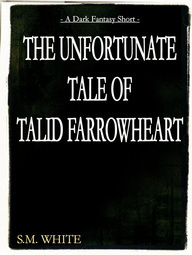 I have just released "The Unfortunate Tale of Talid Farrowheart" as an ebook, available on Kindle and Nook for $.99.
I have just released "The Unfortunate Tale of Talid Farrowheart" as an ebook, available on Kindle and Nook for $.99.This is a Dark Short coming in at a little over 10,000 words.
In preparing to write this post I tried to think back to what drove me to write this story, and have, unfortunately, come up blank. When considering this post I hadn't intended on giving the back story to the short, but I thought it might add an element of interest, but in the interest of not-being-able-to-recall-events, I'll have to skip over the inspirational aspect.
So instead I'll just talk a bit about the story, what I like and what I think people will enjoy.
Being a short story, clocking in just a little over 10,000 words, I wanted to be quick with the plot. But at the same time I wanted those lingering moments when I could have the characters reflect for a moment, when I could let the setting and world say something to the reader. Hopefully I was able to achieve this balance. There are moments of rapid fire action, intermingled with stretches of self-realization and contemplation. All these components are vital to this story. The characters of Talid and Darstarn are reflective individuals. While Darstarn is the more honorable of the two, working as the king's Justice, Talid is his opposite, a commoner turned criminal who's life has taken an ignoble turn. My blurb for the short is as follows: "When Talid Farrowheart barters with the Burnt God, he comes to learn the true terror of granted desire." I had considered likening it to the short story, "The Monkey's Paw," by W.W. Jacobs. And while there is a vague similarity, "Talid Farrowheart" stands on its own through its use of treachery alone. Where "The Monkey's Paw" granted twisted wishes, "Talid Farrowheart" is more or less the tale of a man tricked into agreeing to terms he hadn't known he could fulfill, and then compelled to fulfill them. I'm skating around the obvious here so that I don't give anything away about the story, because I know there will be some of you who haven't read it yet, this being perhaps your introduction, but I wanted to give a familiar feel to it. The quote from "The Monkey's Paw" is apt here, and echoes throughout "Talid Farrowheart."
"Be careful what you wish for, you may receive it."
This story is a bit different from other shorts that I've written in that it's sort of broken into chapters. The breaks come between character viewpoint changes, and the heading for each section gives a hint about the character within. I thought it was a neat idea to incorporate.
Things I like about this story. For me, I think the interest lies more heavily in the interactions between characters. You have a man on the run from the law, hiding his memories by indulging in drugs and alcohol. You have a lawman chasing down a criminal, reprimanding himself for not stopping the man and for not apprehending him earlier. You have an old man who shuns strangers, but takes one in on the grounds that the two share a dislike for women. When these characters interact with each other, and with other cast members of the story, you really get a sense of place for each of them. They, roughly, complement each other. And that's really what I enjoyed most about writing this story. While the overall plot is dark and harrowing, the asides with the characters provide a small measure of lightness.
To wrap up, I'll give a small snippet from the story to whet you appetite. It's a more humorous bit, an injection of levity in an otherwise gloomy tale. So if you're wanting something disturbing to read this Halloween, or you're just in the mood to say, "Holy Fuck Christ!" then I suggest you give this story a read.
From "The Unfortunate Tale of Talid Farrowheart"
“This road,” Talid said, “it leads to?”
She glanced down the road in the direction of her travel. “East. The town of Staffen.” She turned back to him. “How did you come to get lost? It’s only a small span between Staffen and Stomm.”
“A few too many drinks, perhaps?” Talid searched his memories for what might have brought him here. He knew it had been trouble. Trouble was always the reason he couldn’t remember where he’d last been. But he couldn’t recall what trouble.
“A ride then?” the woman offered. “You can strap your mount to the wagon.”
“Actually I’d prefer to head in any other direction. Thank you.” Talid glanced around, searching for a path through the trees at his back, and again for something of interest across the road.
“I could make the journey worth it.” The woman gave a small smile, something that might have been attractive on the lips of a tinier, comelier woman.
“I’m not much fond of the sea,” he said to the woman, scratching at his long nose.
“What’s that got to do with anything?” Her fists found her hips, and there added a tremendousness her frame could have done without.
“Whales,” Talid said absently. “I assume that is your ilk. Besides,” he leaned toward her and sniffed, “you smell like tuna.”
It was not possible, yet the woman puffed up, and her face went as scarlet as burnt flesh. “You are a rude scoundrel. And I hope the world gives you no joy for your lack of manners.” She lashed the reins and sent the horses forward with a jolt.
“And I hope the world denies you desserts!” he yelled after. She turned and gave him a scowl.
Published on October 27, 2013 13:07
October 8, 2013
The Return of My Sega Saturn
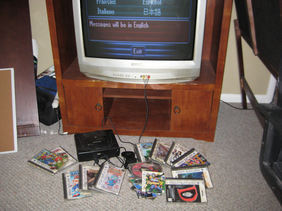 Obligatory real life screen cap. A year ago, something dear to me died. It simply stopped being. There was nothing of its prior verve or excitement left to be seen, no lights. Mostly, it was dead weight. But I still loved it, and tucked it away in the closet, thinking that keeping it out of sight made it less real. I remember how crushed I was, how I couldn't really believe it had left me. It had be something dear to me for almost 15 years. That's nearly the same shelf-life as most pets, you know. And as most pets do, it gave me an inordinate amount of enjoyment.
Obligatory real life screen cap. A year ago, something dear to me died. It simply stopped being. There was nothing of its prior verve or excitement left to be seen, no lights. Mostly, it was dead weight. But I still loved it, and tucked it away in the closet, thinking that keeping it out of sight made it less real. I remember how crushed I was, how I couldn't really believe it had left me. It had be something dear to me for almost 15 years. That's nearly the same shelf-life as most pets, you know. And as most pets do, it gave me an inordinate amount of enjoyment.Obviously, with the image, the runaround is needless. Yes, I'm talking about my Sega Saturn.
Given to me on Christmas of '97 or '98, I can still remember that midnight. See, after I was 11 years old or so I never really did go to sleep on Christmas nights. My sister and I were put in our rooms while my parents let 'Santa' put the gifts out. And that Christmas I was beyond excited. So it was when the bedroom door opened and I was allowed out, I raced into the living room, scanned the presents under the tree, and grabbed up the Sega Saturn. I might have squealed a bit, as most young boys are wont to do when they're elated. After that it probably took all of three minutes for me to get the system out the box and hooked up to the t.v. Then, after racking my brain over which game I'd play first, the choices being Virtua Cop, Virtua Fighter 2, and Daytona USA, I put in Virtua Fighter and began my love affair with the Saturn. At that time, the Saturn graphics blew me away. The sharp edges, the vanishing pixels, the boxy outlines, it was so incredibly lifelike. Since all things in life are made of squares... But at that time, the graphics were like nothing I'd ever seen. I hadn't owned a Playstation, and didn't know anyone who did. So the Saturn was my introduction to the 32-bit era. And I loved it. How much sleep I got in those following days, I can't say. Maybe my growth was stunted, maybe my friends were shunned. Regardless, the Saturn was spectacular.
Over the years, even with advancing consoles hitting the market, and the Saturn steadily falling to the wayside, I never gave up on it. Sure, I bought newer systems, but they were always placed beside the Saturn, and games like Dark Savior, Blazing Heroes, Croc, Sonic R, Daytona USA, Virtua Fighter 2, Panzer Dragon, Scud, and the like were never ignored. I loved them. I still love them. And that's why, after learning of the sudden reincarnation of my Sega Saturn last night, and spending a couple of hours revisiting old virtual realms, I've decided to write a blog post that veers quite severely away from anything resembling Fantasy writing. Unless of course you count my upcoming comments on Dark Savior and Blazing Heroes, in which case it only veers somewhat severely.
So, after playing a handful of games last night I feel sufficiently prepared to give a detailed examination of their playability and quality. Onward to the reviews!
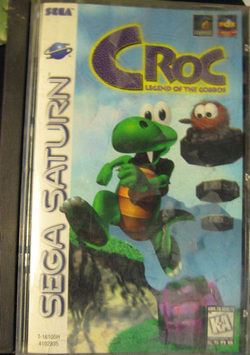 Let me start with Croc: Legend of the Gobbos, the game that was to challenge Super Mario 64. This wasn't exactly the case. It was kind of like a Wheelchair tennis player challenging any professional Top 100 player. There really was no challenge there, even if you allowed for the two bounce rule, which they don't in video games.
Let me start with Croc: Legend of the Gobbos, the game that was to challenge Super Mario 64. This wasn't exactly the case. It was kind of like a Wheelchair tennis player challenging any professional Top 100 player. There really was no challenge there, even if you allowed for the two bounce rule, which they don't in video games.The game centers around a crocodile who has to save a bunch of furry creatures called Gobbos, hence the title. It's a good ol' fashioned platformer with terribly frustrating controls. I even had the analog controller, which was supposed to make controlling Croc easier, but only made it all the more difficult because he refused to turn to the left when I pressed left, Argh!, Left! Anyway, each stage has a certain number of Gobbos you're supposed to save. It doesn't tell you how many, and these little bastards are hidden all over the place. Some are even locked in cages that require keys that located above Jello humps. So a lot of time is spent looking around the board, figuring out where these guys are located, which is tons of fun, at first.
Then, there's the platforming. This is the main concept of the game. Jumping from one thing to the next. And with the sometimes unresponsive controls, this is a nail-biting experience. I'm surprised I never developed some kind of nervous tick after spending hours on this game. Yeah, then you reach level 1 - 3 ...
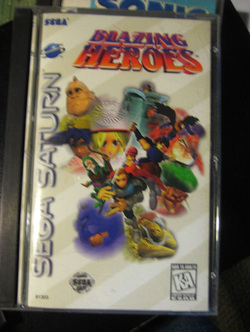 Let me move on to a game that carries somewhat better memories, Blazing Heroes. I can sense it from you know: "Oh, the Fantasy author liked a Fantasy RPG, how startling (end sarcasm)." Of course I liked Fantasy games! From the NES's Zelda onward, I've loved Fantasy games. Something about a sword and a little magic, right?
Let me move on to a game that carries somewhat better memories, Blazing Heroes. I can sense it from you know: "Oh, the Fantasy author liked a Fantasy RPG, how startling (end sarcasm)." Of course I liked Fantasy games! From the NES's Zelda onward, I've loved Fantasy games. Something about a sword and a little magic, right?The game. Blazing Heroes is a Strategy RPG, which means you have to think a little bit when you play. It's not a typical hack and slash by any means, so settle in for the long haul when playing. Your characters move along a grid, and depending on what class they are they can only move a certain distance, and attack at a certain distance. Example: An archer has a limited number of squares he can move along the grid, yet his range for attack is further than most, I mean arrows vs. sword, c'mon. A swordsman can move a longer distance, but his attack range is limited to an adjacent square. So that's the battle plan. It's reminiscent of the Sega Genesis' Shining Force series, which I love!
The game was absolutely dynamic with a ton of characters, weapons, spells, and locations in which to battle. Let me give you the blurb from the back of the case:
Oldeland, once a land of peace and serenity, is now embroiled in turmoil. The evil Lord Bane and his ruthless band of marauders have overtaken the four kingdoms that rule this land.If that doesn't get your blood pumping for adventure then it's probably because the game relies more on innovative graphics rather than story ... But, man, this game was good. So good in fact that I remember ditching my female friend at the time just so I could spend a couple more hours playing it. Needless to say, she wasn't my friend long after that.
Now you must rely on the special power of a Prince, a Ninja, a Priestess, a Lion Man, an Archer and others to reclaim your kingdoms and regain control of this beautiful land you once called your own!
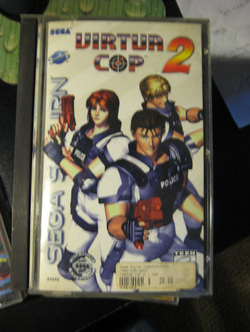 Next up, Virtua Cop 1 & 2. These games were a thrill ride. Tense action, disposable enemies, interactive environments, they had it all.
Next up, Virtua Cop 1 & 2. These games were a thrill ride. Tense action, disposable enemies, interactive environments, they had it all.You existed as a flashing reticule that you moved around the screen with the D-pad, a long holler from today's analog controllers. Enemies would pop out of everywhere, and I mean everywhere. Boxes, rooftops, windows, semi-tuck trailers, the side of the television screen, the bottom of the television screen (it was like you had no peripheral vision), tops of cranes, cars. Any opening on the screen could harbor a man with ill-intent. Which, come to think of it, there weren't any badguy women. They were all men. Well, some of the enemies were masked, so in the spirit of equality I'll assume those were females. Bad guys and girls all around
You had to be quick in this game. The screen moved on its own, but you had to be ready to follow it, and ready to shoot anyone or anything. This wouldn't be so bad if not for the innocents that roamed these area, jumping out yelling, "Don't shoot me!" and waving their damn hands around for thirteen minutes (or close enough). And, as if that weren't bad enough, they'd run in front of the guys trying to shoot you, in which case you'd need perfect aim to shoot around the innocent and hit the bad guy. And, if you 'accidentally' shot the innocent, you lost a heart. Hearts are precious in this game.
That frustration aside, there was nothing more satisfying than blowing up a barrel and killing four or five enemies. Or destroying a barrel and seeing a tower come down. Or shooting out a cars tires and watching as the vehicle pirouetted off the side of the road.
Plus, bosses shot rocket launchers and fireballs at you. In one case, a rather 'roided up boss tosses a police truck at you, which your handy-dandy police revolver is able to shoot aside. Oh, the false reality of video games.
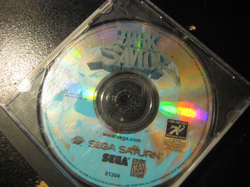 Finally, I'm gonna touch on a game that is truly dear to my heart. Fuckin' Dark Savior.
Finally, I'm gonna touch on a game that is truly dear to my heart. Fuckin' Dark Savior.Damn, this game. This game was incredible. From the story to the gameplay to the graphics, I adore this game. You can never really know heartbreak until your Dark Savior saved game data is lost because your Sega Saturn battery craps out and you never thought to buy a memory cartridge. I invested far too many hours in this game, because not only can you beat it once, but you can beat it five(?) different times, with the story changing based on how slowly or quickly you proceed through the opening level.
The story: You're a kind of bounty hunter that has to escort a mutant-like prisoner to an island jail. During the boat ride, the villain breaks free of his cage and you have to go and stop him. Depending on how fast you make it to him, he either escapes to the prison island or you have to fight him on the boat.
The game uses a unique 3D style, similar to the Genesis game Landstalker. The mix of platforming, puzzle-solving, and fighting, made the game fun and ever-changing. At times, I suppose it became monotonous, but the wide array of new characters, and the unique setting really makes the game something to return to.
A quick aside. When I started writing "The Pale Hand of God," and used the prison city as the main backdrop for the novel, I never once considered how closely is comes to resembling the prison island of Dark Savoir. Firstly, the idea for "The Pale Hand of God" came to me in a dream, of which I think I've talked. But I can't help wonder whether or not the concept of Dark Savoir wasn't tucked away in my subconscious, manifesting itself, even if slightly, in my dream.
After the aside . . . One of the really cool things about this game was the way that after fighting an opponent, you had the chance to capture them, and then use them in any other fight that you happened upon. In this way, I thought the game did an excellent job of creating new experiences at different turns. I can recall using a wheelchair-bound, machete-weilding prisoner in quite a few fights.
After spending this last hour talking about these games, the itch as returned. I really need to get back to playing my Saturn. Especially because I'm not sure how much longer this rise from the grave might last.
Hopefully a few of you out there had the chance to play this system, and while it wasn't the greatest by any means, it provided me with a worthwhile experience. And I'm sure I'll own mine long after its final turn of the disc.
Published on October 08, 2013 18:27
September 25, 2013
E-mail Questions and Their Answers
Today I'm going to respond to a few questions e-mailed to me from readers. And although I have already replied to the e-mails, I thought the questions were the sort I should answer publicly, in case anyone out there was curious and just too lazy to write me. So, without much more delay, the questions!
"You said you might show the cover for the next lonely man book. Are you?"
Yes.
"Will there be a scene in City of Blades that shows Mhets and Sobrita together?"
No. I'll expand on this a bit. I'm all for revisiting the past. That's been shown in the prologue to "The Witch's Price" and throughout "The Paruus Histories." But in regards to a scene with Mhets and Sobrita, no. I feel that the emotional connection between the characters has been established to such a degree that any attempt at adding anything more might reach the point of being too sugary. My "Lonely Man" books aim for a darker, gritter feel. Sometimes the darkness and grit comes out through Mhets' grief, which is fine. But I see no need to bring in a scene solely for the purpose of rephrasing Mhets and Sobrita's relationship.
"You haven't posted any short stories on your website for a while. Are you working on any?"
I am working on one, a prequel novella to "The Pale Hand of God." But when I say 'working' what I mean is that I have a few pages done and I sometimes think about writing others. This is due to my current writing on "City of Blades." As for more short stories . . . maybe in the future, when I'm not so bogged down on novels. But I will say that my short story "Golden Sword," will be in "City of Blades." And I may post that short on my website. We'll see.
"You talk a lot about reviews for your books. How do you deal with negative reviews? Fellow writer here, dreading the day I release my story to the world."
First, if you're dreading getting your story out because you're afraid some people aren't going to like it, then you're in for a heap of trouble in the writing world. I've come to terms with the fact that some people just have different tastes than others. Some won't like my book and they'll want to let me know. That's fine. Not everyone will like your book. If you think about it, take your favorite story of all time, whatever it is, and try to understand that there is someone, somewhere who's read it and absolutely hates it. Yeah, it's hard to wrap your head around that. But that's the world. I can only say that you should write something that makes you happy, that you can be proud of. You'll find people who enjoy it, and those will be the readers you turn to when a nasty review rears its nasty little head. Also, some people are just meanies.
"Maps?"
Yes. Forthcoming. I'm no cartographer, but the scribblings I've so far amassed will soon take shape. These will be for "The Paruus Histories." "The Lonely Man," I'm not sure yet.
There's those, and to close, scroll below.
"The Lonely Man: City of Blades" Reveal!
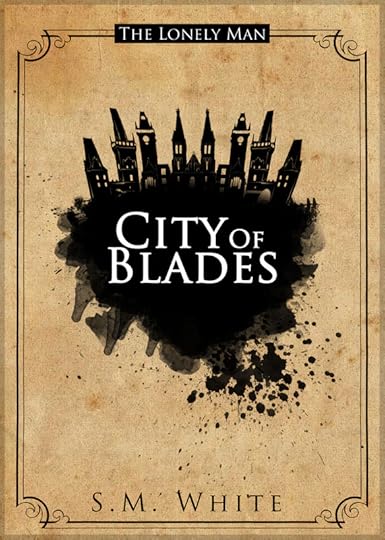
"You said you might show the cover for the next lonely man book. Are you?"
Yes.
"Will there be a scene in City of Blades that shows Mhets and Sobrita together?"
No. I'll expand on this a bit. I'm all for revisiting the past. That's been shown in the prologue to "The Witch's Price" and throughout "The Paruus Histories." But in regards to a scene with Mhets and Sobrita, no. I feel that the emotional connection between the characters has been established to such a degree that any attempt at adding anything more might reach the point of being too sugary. My "Lonely Man" books aim for a darker, gritter feel. Sometimes the darkness and grit comes out through Mhets' grief, which is fine. But I see no need to bring in a scene solely for the purpose of rephrasing Mhets and Sobrita's relationship.
"You haven't posted any short stories on your website for a while. Are you working on any?"
I am working on one, a prequel novella to "The Pale Hand of God." But when I say 'working' what I mean is that I have a few pages done and I sometimes think about writing others. This is due to my current writing on "City of Blades." As for more short stories . . . maybe in the future, when I'm not so bogged down on novels. But I will say that my short story "Golden Sword," will be in "City of Blades." And I may post that short on my website. We'll see.
"You talk a lot about reviews for your books. How do you deal with negative reviews? Fellow writer here, dreading the day I release my story to the world."
First, if you're dreading getting your story out because you're afraid some people aren't going to like it, then you're in for a heap of trouble in the writing world. I've come to terms with the fact that some people just have different tastes than others. Some won't like my book and they'll want to let me know. That's fine. Not everyone will like your book. If you think about it, take your favorite story of all time, whatever it is, and try to understand that there is someone, somewhere who's read it and absolutely hates it. Yeah, it's hard to wrap your head around that. But that's the world. I can only say that you should write something that makes you happy, that you can be proud of. You'll find people who enjoy it, and those will be the readers you turn to when a nasty review rears its nasty little head. Also, some people are just meanies.
"Maps?"
Yes. Forthcoming. I'm no cartographer, but the scribblings I've so far amassed will soon take shape. These will be for "The Paruus Histories." "The Lonely Man," I'm not sure yet.
There's those, and to close, scroll below.
"The Lonely Man: City of Blades" Reveal!

Published on September 25, 2013 15:51
August 26, 2013
Guest Post: Jess Hanna
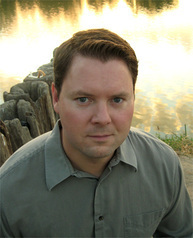 If it Causes you to Sin
If it Causes you to SinWhew! This is my last stop on the Mega Dark Blog Tour. Thank you S.M. White for hosting me. This time I am going to tell you a bit about my new short story, If it Causes you to Sin, as well as plans for future books.
A few months back, I saw a news story about a man who went into a home improvement store and tried to cut off his arms. He survived and so did his arms, but it got me thinking, what might be someone’s motivation for trying to harm themselves in such a material way. And that was the beginning of If it Causes you to Sin.
I forgot about the story (since I am in the middle of writing a book that I need to finish, but keep allowing myself to get sidetracked from) until I was asked to pen a possible entry into the Untold Podcast hosted by Nathan James Norman. He does a fantastic job with performing radio-type dramas for short stories under 3,000 words. I probably hadn’t written anything that short since grade school, but I was up for the challenge!
I managed to get the first draft of the manuscript just over the limit, and then let my wife read it. She hated it. She thought it was well written, but felt the overall message wasn’t clear. After a few heated discussions (see arguments), I decided to take some of her advice and re-write the whole thing. Lo and behold, my re-write was just under 3,000 words. Now that's what I call providence!
This time, I didn’t bother submitting it anywhere to have it published. I did it myself, with the graphic art for the cover provided by my talented wife (without whom I would be hopelessly lost), and is now available for free as a sample of my work.
So what about my plans for the future? Well, I fully intend to continue writing. I am currently in the last third of a book about night terrors and sleep paralysis. I'm still uncertain of where it will take me, so I'm going to let that one fester for a while after the first draft is completed. At that time I will probably get started on an 'alien story' I have already begun to plot in my mind. Perhaps I am following the cliché path of similar authors, as mentioned in my first post on this blog tour, but I don't care. I plan to follow the inspiration and know it is going to be fun to write, edit, and read. I can feel it! I hope you will join me as I continue spiraling further into the Mega Dark to fully expose the truth of our ancient enemy.
To find out more about me and my writing, visit my website at:
http://www.jesshanna.com/
The voices have accused him of unrepentant sin. He is ready to take desperate measures to absolve himself of guilt from his past and to stop the relentless torment. Prepare yourself for a descent into madness and pray it's not too late.
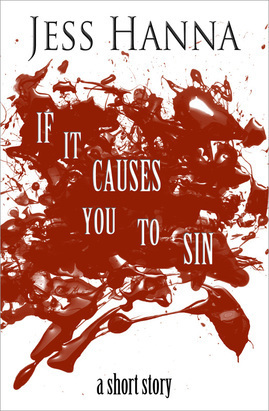
Published on August 26, 2013 16:09
August 17, 2013
Guest Post: Patrick Todoroff
Not a post on indie-publishing or faith in fiction or any such. This time, it's personal. Thanks for Mr. White for the opportunity. *** WARGAMING - An odd, analog hobby for a digital age. Forget WoW - gimme 28mm lead tin alloy. H.G. Wells was the one to popularize and codify it for us English types way back in 1913. Wiki up here You can insist it's 'table top military re-enactments' or 'miniature tactical simulation' all you want, but you're really playing with toy soldiers. After all these years, I still have to resist making "pew, pew, pew! ratatatatatat! aaargh..." sound effects as the game unfolds. 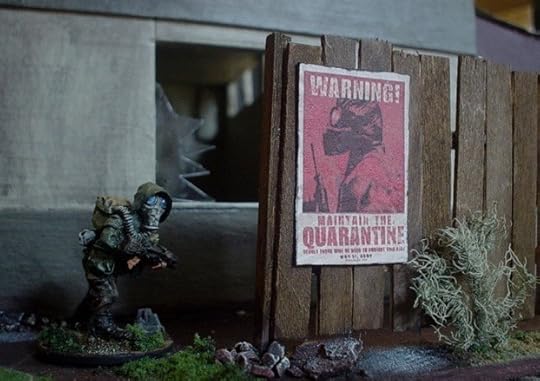 based on the awesomely brooding PC game STALKER[/caption] Some background: A car accident at the age of 7 left me less than athletic, and much of my childhood was spent trying to but never quite fitting in to normal kid-activities. I was self-conscious, an outsider, pretty confused and unhappy, actually. Spent a lot of time in my mind. And reading. I owe a debt of gratitude to Lloyd Alexander for his Chronicles of Prydain series. IIRC, I was 13 when my stepfather, trying to find something that interested me, give me some hobby to focus on, took me to a toy soldier factory in White Plains, New York. We got the tour: melting pots for lead/tin, round rubber molds, big spin-casting machines, rows and rows of numbered boxes filled with English Civil War Roundhead pikemen, Pirates, French Hussars, Prussian mercenaries, Green Mountain Boys, Napoleonic 9-pounder horse artillery... They were all there, thousand of them, shiny, tiny and new.
based on the awesomely brooding PC game STALKER[/caption] Some background: A car accident at the age of 7 left me less than athletic, and much of my childhood was spent trying to but never quite fitting in to normal kid-activities. I was self-conscious, an outsider, pretty confused and unhappy, actually. Spent a lot of time in my mind. And reading. I owe a debt of gratitude to Lloyd Alexander for his Chronicles of Prydain series. IIRC, I was 13 when my stepfather, trying to find something that interested me, give me some hobby to focus on, took me to a toy soldier factory in White Plains, New York. We got the tour: melting pots for lead/tin, round rubber molds, big spin-casting machines, rows and rows of numbered boxes filled with English Civil War Roundhead pikemen, Pirates, French Hussars, Prussian mercenaries, Green Mountain Boys, Napoleonic 9-pounder horse artillery... They were all there, thousand of them, shiny, tiny and new. 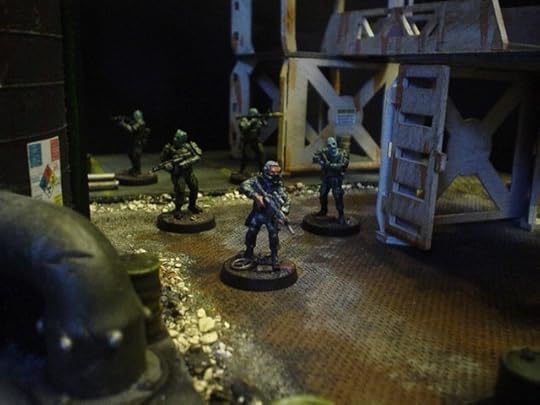 The thing I remember most was how happy the owner/guide was. I recall having the distinct impression when I was younger that I didn't know a single adult who seemed truly happy. But this guy was. His face lit up as he recounted how he and his friends rented out a local high-school gymnasium for a week during the summer and re-enacted the battle of Waterloo in miniature. The whole thing to scale. He was genuine. He really enjoyed what he did for work. He seemed content. I remember him slipping in a couple extra figs with our purchase that day, saying I was welcome to come back any time. Sit in on a game, even. American War of Independence. Those were my first figs. Blame 'Johnny Tremaine', 'My brother Sam is Dead', and 'Drums along the Mohawk'. No Lobsterback or Hessian mercenary was going to run off my patriotic militia and Continental army regulars. Don't tread on me, dude. I had a game room in the basement, a hobby desk and a table made from an old door on cinderblocks. I spent hours painting the uniforms, facings, and muskets, flocking model railroad trees, building fences out of matchsticks, and making barns and farm houses out of cereal boxes and construction paper. One evening, I re-created a British raid on an innocent American town; I shut the door, set up my Redcoats and minutemen, turned out the light, then used stolen matches to set fire to all the little houses. I got down eye level and watched the story unfold as it all burned up. (Yes, I got in a lot of trouble. But it was worth it.)
The thing I remember most was how happy the owner/guide was. I recall having the distinct impression when I was younger that I didn't know a single adult who seemed truly happy. But this guy was. His face lit up as he recounted how he and his friends rented out a local high-school gymnasium for a week during the summer and re-enacted the battle of Waterloo in miniature. The whole thing to scale. He was genuine. He really enjoyed what he did for work. He seemed content. I remember him slipping in a couple extra figs with our purchase that day, saying I was welcome to come back any time. Sit in on a game, even. American War of Independence. Those were my first figs. Blame 'Johnny Tremaine', 'My brother Sam is Dead', and 'Drums along the Mohawk'. No Lobsterback or Hessian mercenary was going to run off my patriotic militia and Continental army regulars. Don't tread on me, dude. I had a game room in the basement, a hobby desk and a table made from an old door on cinderblocks. I spent hours painting the uniforms, facings, and muskets, flocking model railroad trees, building fences out of matchsticks, and making barns and farm houses out of cereal boxes and construction paper. One evening, I re-created a British raid on an innocent American town; I shut the door, set up my Redcoats and minutemen, turned out the light, then used stolen matches to set fire to all the little houses. I got down eye level and watched the story unfold as it all burned up. (Yes, I got in a lot of trouble. But it was worth it.) 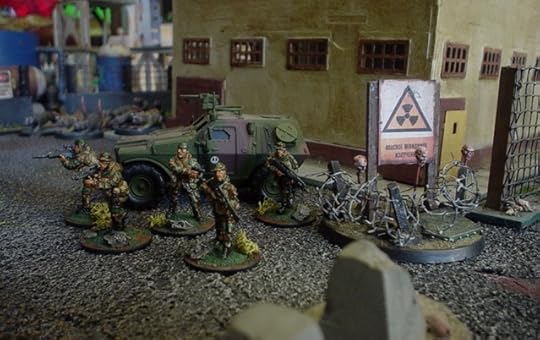 Flash forward a couple decades, past detours into girls, drugs, friends doing B & Es on liquor stores, college, conversion, ministry, foreign field missionary work ... to my eldest son coming home one day with a plea from his Middle School for After-School Enrichment Program teachers. "Anything... Hobby, craft, sport - anything at all." it said. "Please. We'll pay you." Filled out the paper confident of a 'thanks but no thanks' response, (esoteric, masculine, war toys, *gasp* ...) and ended up with a "Military Miniatures and Table Top Gaming" program in two local middle schools for the next four years. (Getting paid to play with kids and toy soldiers. I love this country.) Response was so overwhelming, I rented out the empty shop next to my glass studio and ran a game room on the weekend.
Flash forward a couple decades, past detours into girls, drugs, friends doing B & Es on liquor stores, college, conversion, ministry, foreign field missionary work ... to my eldest son coming home one day with a plea from his Middle School for After-School Enrichment Program teachers. "Anything... Hobby, craft, sport - anything at all." it said. "Please. We'll pay you." Filled out the paper confident of a 'thanks but no thanks' response, (esoteric, masculine, war toys, *gasp* ...) and ended up with a "Military Miniatures and Table Top Gaming" program in two local middle schools for the next four years. (Getting paid to play with kids and toy soldiers. I love this country.) Response was so overwhelming, I rented out the empty shop next to my glass studio and ran a game room on the weekend. 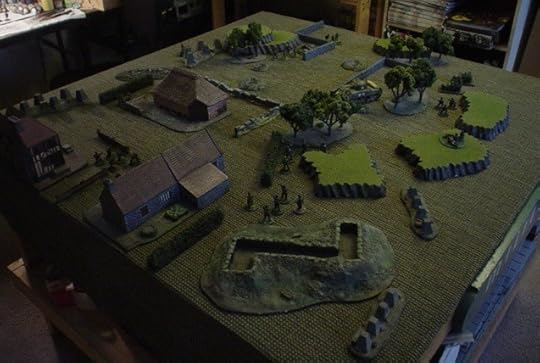
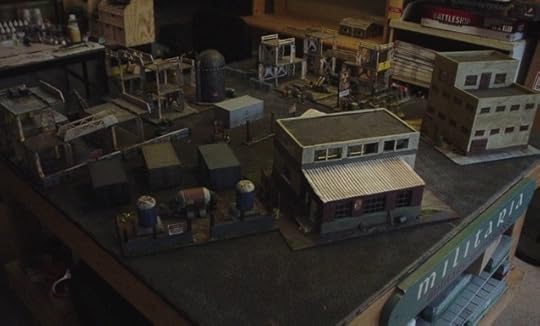 Thirty-six years later, I'm mostly into Sci Fi, near-future stuff now, with a smattering of Western Europe - Saving Private Ryan - WW II, and some 6mm Modern Micro-armor. Yes, I'm a collector. I really do find painting with those tiny brushes relaxing. I get a kick out of scratch-building an abandoned warehouse or some Post-apoc industrial center. I like strategy, tactics, the coolness-quotient of new figs, the interactive, moving diorama as the mission unfolds. But what I thrive on is the friendship, the human interaction over the gaming table. It's a brief intermission when the only conflict in your world is in miniature on a table top and the only threats are 28mm scale. It's the banter, laughing at the fleeing hero, mocking the point-blank miss, incredulous at the impossible hit, cackling over the lucky save... It's the look on someone's face when they win. Or even lose a hard-fought battle.
Thirty-six years later, I'm mostly into Sci Fi, near-future stuff now, with a smattering of Western Europe - Saving Private Ryan - WW II, and some 6mm Modern Micro-armor. Yes, I'm a collector. I really do find painting with those tiny brushes relaxing. I get a kick out of scratch-building an abandoned warehouse or some Post-apoc industrial center. I like strategy, tactics, the coolness-quotient of new figs, the interactive, moving diorama as the mission unfolds. But what I thrive on is the friendship, the human interaction over the gaming table. It's a brief intermission when the only conflict in your world is in miniature on a table top and the only threats are 28mm scale. It's the banter, laughing at the fleeing hero, mocking the point-blank miss, incredulous at the impossible hit, cackling over the lucky save... It's the look on someone's face when they win. Or even lose a hard-fought battle. 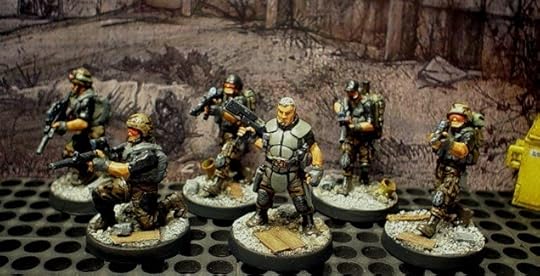 I like that look because it's the same one that guy had all those years ago in White Plains. *** Patrick Todoroff blogs at: http://pattodoroff.com/ His latest book is available at Amazon: http://www.amazon.com/dp/B00DQBECUY
I like that look because it's the same one that guy had all those years ago in White Plains. *** Patrick Todoroff blogs at: http://pattodoroff.com/ His latest book is available at Amazon: http://www.amazon.com/dp/B00DQBECUY
 based on the awesomely brooding PC game STALKER[/caption] Some background: A car accident at the age of 7 left me less than athletic, and much of my childhood was spent trying to but never quite fitting in to normal kid-activities. I was self-conscious, an outsider, pretty confused and unhappy, actually. Spent a lot of time in my mind. And reading. I owe a debt of gratitude to Lloyd Alexander for his Chronicles of Prydain series. IIRC, I was 13 when my stepfather, trying to find something that interested me, give me some hobby to focus on, took me to a toy soldier factory in White Plains, New York. We got the tour: melting pots for lead/tin, round rubber molds, big spin-casting machines, rows and rows of numbered boxes filled with English Civil War Roundhead pikemen, Pirates, French Hussars, Prussian mercenaries, Green Mountain Boys, Napoleonic 9-pounder horse artillery... They were all there, thousand of them, shiny, tiny and new.
based on the awesomely brooding PC game STALKER[/caption] Some background: A car accident at the age of 7 left me less than athletic, and much of my childhood was spent trying to but never quite fitting in to normal kid-activities. I was self-conscious, an outsider, pretty confused and unhappy, actually. Spent a lot of time in my mind. And reading. I owe a debt of gratitude to Lloyd Alexander for his Chronicles of Prydain series. IIRC, I was 13 when my stepfather, trying to find something that interested me, give me some hobby to focus on, took me to a toy soldier factory in White Plains, New York. We got the tour: melting pots for lead/tin, round rubber molds, big spin-casting machines, rows and rows of numbered boxes filled with English Civil War Roundhead pikemen, Pirates, French Hussars, Prussian mercenaries, Green Mountain Boys, Napoleonic 9-pounder horse artillery... They were all there, thousand of them, shiny, tiny and new.  The thing I remember most was how happy the owner/guide was. I recall having the distinct impression when I was younger that I didn't know a single adult who seemed truly happy. But this guy was. His face lit up as he recounted how he and his friends rented out a local high-school gymnasium for a week during the summer and re-enacted the battle of Waterloo in miniature. The whole thing to scale. He was genuine. He really enjoyed what he did for work. He seemed content. I remember him slipping in a couple extra figs with our purchase that day, saying I was welcome to come back any time. Sit in on a game, even. American War of Independence. Those were my first figs. Blame 'Johnny Tremaine', 'My brother Sam is Dead', and 'Drums along the Mohawk'. No Lobsterback or Hessian mercenary was going to run off my patriotic militia and Continental army regulars. Don't tread on me, dude. I had a game room in the basement, a hobby desk and a table made from an old door on cinderblocks. I spent hours painting the uniforms, facings, and muskets, flocking model railroad trees, building fences out of matchsticks, and making barns and farm houses out of cereal boxes and construction paper. One evening, I re-created a British raid on an innocent American town; I shut the door, set up my Redcoats and minutemen, turned out the light, then used stolen matches to set fire to all the little houses. I got down eye level and watched the story unfold as it all burned up. (Yes, I got in a lot of trouble. But it was worth it.)
The thing I remember most was how happy the owner/guide was. I recall having the distinct impression when I was younger that I didn't know a single adult who seemed truly happy. But this guy was. His face lit up as he recounted how he and his friends rented out a local high-school gymnasium for a week during the summer and re-enacted the battle of Waterloo in miniature. The whole thing to scale. He was genuine. He really enjoyed what he did for work. He seemed content. I remember him slipping in a couple extra figs with our purchase that day, saying I was welcome to come back any time. Sit in on a game, even. American War of Independence. Those were my first figs. Blame 'Johnny Tremaine', 'My brother Sam is Dead', and 'Drums along the Mohawk'. No Lobsterback or Hessian mercenary was going to run off my patriotic militia and Continental army regulars. Don't tread on me, dude. I had a game room in the basement, a hobby desk and a table made from an old door on cinderblocks. I spent hours painting the uniforms, facings, and muskets, flocking model railroad trees, building fences out of matchsticks, and making barns and farm houses out of cereal boxes and construction paper. One evening, I re-created a British raid on an innocent American town; I shut the door, set up my Redcoats and minutemen, turned out the light, then used stolen matches to set fire to all the little houses. I got down eye level and watched the story unfold as it all burned up. (Yes, I got in a lot of trouble. But it was worth it.)  Flash forward a couple decades, past detours into girls, drugs, friends doing B & Es on liquor stores, college, conversion, ministry, foreign field missionary work ... to my eldest son coming home one day with a plea from his Middle School for After-School Enrichment Program teachers. "Anything... Hobby, craft, sport - anything at all." it said. "Please. We'll pay you." Filled out the paper confident of a 'thanks but no thanks' response, (esoteric, masculine, war toys, *gasp* ...) and ended up with a "Military Miniatures and Table Top Gaming" program in two local middle schools for the next four years. (Getting paid to play with kids and toy soldiers. I love this country.) Response was so overwhelming, I rented out the empty shop next to my glass studio and ran a game room on the weekend.
Flash forward a couple decades, past detours into girls, drugs, friends doing B & Es on liquor stores, college, conversion, ministry, foreign field missionary work ... to my eldest son coming home one day with a plea from his Middle School for After-School Enrichment Program teachers. "Anything... Hobby, craft, sport - anything at all." it said. "Please. We'll pay you." Filled out the paper confident of a 'thanks but no thanks' response, (esoteric, masculine, war toys, *gasp* ...) and ended up with a "Military Miniatures and Table Top Gaming" program in two local middle schools for the next four years. (Getting paid to play with kids and toy soldiers. I love this country.) Response was so overwhelming, I rented out the empty shop next to my glass studio and ran a game room on the weekend. 
 Thirty-six years later, I'm mostly into Sci Fi, near-future stuff now, with a smattering of Western Europe - Saving Private Ryan - WW II, and some 6mm Modern Micro-armor. Yes, I'm a collector. I really do find painting with those tiny brushes relaxing. I get a kick out of scratch-building an abandoned warehouse or some Post-apoc industrial center. I like strategy, tactics, the coolness-quotient of new figs, the interactive, moving diorama as the mission unfolds. But what I thrive on is the friendship, the human interaction over the gaming table. It's a brief intermission when the only conflict in your world is in miniature on a table top and the only threats are 28mm scale. It's the banter, laughing at the fleeing hero, mocking the point-blank miss, incredulous at the impossible hit, cackling over the lucky save... It's the look on someone's face when they win. Or even lose a hard-fought battle.
Thirty-six years later, I'm mostly into Sci Fi, near-future stuff now, with a smattering of Western Europe - Saving Private Ryan - WW II, and some 6mm Modern Micro-armor. Yes, I'm a collector. I really do find painting with those tiny brushes relaxing. I get a kick out of scratch-building an abandoned warehouse or some Post-apoc industrial center. I like strategy, tactics, the coolness-quotient of new figs, the interactive, moving diorama as the mission unfolds. But what I thrive on is the friendship, the human interaction over the gaming table. It's a brief intermission when the only conflict in your world is in miniature on a table top and the only threats are 28mm scale. It's the banter, laughing at the fleeing hero, mocking the point-blank miss, incredulous at the impossible hit, cackling over the lucky save... It's the look on someone's face when they win. Or even lose a hard-fought battle.  I like that look because it's the same one that guy had all those years ago in White Plains. *** Patrick Todoroff blogs at: http://pattodoroff.com/ His latest book is available at Amazon: http://www.amazon.com/dp/B00DQBECUY
I like that look because it's the same one that guy had all those years ago in White Plains. *** Patrick Todoroff blogs at: http://pattodoroff.com/ His latest book is available at Amazon: http://www.amazon.com/dp/B00DQBECUY
Published on August 17, 2013 12:32
August 6, 2013
Guest Post: Mark Carver
 Mark Carver
Mark Carver MEGA-DARK BLOG POST: BROTHER’S KEEPER
I don’t like stories with heroes. I enjoy reading about complex and conflicted characters who may do heroic things, but cut-and-dried heroes and villains bore me.
When I began writing The Age of Apollyon, I wanted to sculpt an intriguing protagonist, so I came up with Patric Bourdon, an aimless, self-indulgent French twenty-something who spends his time getting high and going to brothels. And he also worships Satan, though only half-heartedly. His real god is himself and he exists only to serve his own appetites.
Now a book about a philandering Satanist would be a bit of a drag to read, so I had to balance the equation: introducing Tourec Beauchamp, Patric’s half-brother. In contrast to Patric’s Satanic allegiance, Tourec is a Christian. But not your average church-on-Sundays, Bible-inspired-slogan-on-your-t-shirt kind of Christian. Tourec storms into black masses and slaughters Satanic priests in the middle of their rituals.
It’s kind of hard to say who is the bigger jerk between the two of them. Patric’ Satan-worshipping is rather benign and harmless, but come on, he’s worshipping Satan. But just because Tourec has crosses tattooed on his skin and prays every night before bed doesn’t excuse the fact that he’s a cold-blooded murderer.
The two brothers are apart for most of the book but their lives are drawn together like two stars caught in each other’s gravity. When they do finally meet, things go supernova. Having three younger brothers myself, I drew on my own experiences and emotions growing up to help shape what these brothers thought and felt, and the tension and affection crackling between them is one of my favorite aspects of this book. I hope you’ll feel the same way.
The Age of Apollyon is available for Kindle, Nook, and in paperback. Black Sun, book # 2 in The Age of Apollyon Trilogy is also out now, and the final book, Scorn, will be released this Halloween.
And be sure to check out my new 8-volume short story series The Jerusalem Chronicles, where I flesh out Tourec’s back story. Volume One is available now and Volume Two will be released in just a couple of weeks.
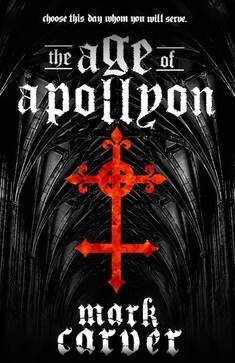
Published on August 06, 2013 02:20
August 1, 2013
Guest Post: Jen Cudmore
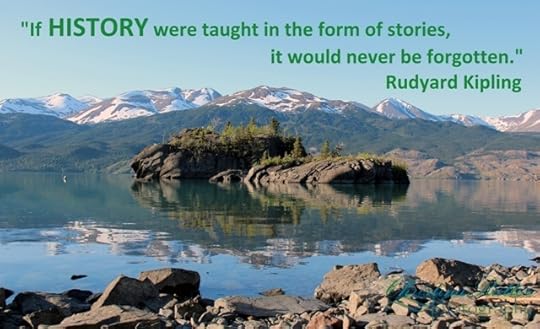 Why are historical novels so enticing?
Why are historical novels so enticing?There's something intriguing about stories set in history, a fascination that touches our soul. Although basic issues of family and survival remain the same over the years, the challenges the people faced were quite different from modern times. Men and women were called to be courageous in ways that are no longer required.
We're inspired by stories about Robin Hood and William Wallace, whose skills with swords and bows were a means of defense from oppression. Every boy and many women learned how to handle such weapons. Now the art is now merely a hobby and only learned by some.
What draws readers to novels set in other time periods? The Viking era creates a sense of fear and awe in the reader because the Vikings were so menacing in their efforts to expand. The Medieval Period, full courageous kings and knights, was a time when chivalry reigned. The political and religious tension of the Tudor Era creates a fascinating background for stories. The Regency Period is enticing because the rules of society, the formal words and behaviors, fosters a romantic environment where much is forbidden and left unsaid.
But it's not just the mystery of the time period, it's also the curiosity of the reader, who desires to know what life was like for the people who lived back then. When historical details are woven through each chapter, the story's inspiration becomes much more powerful.
For my current series, The Lawmen of Clayton County, I chose the Old West, with its tough pioneers, rugged cowboys, and lawless society. The stories take place in three separate towns in the newly settled Oregon Territory during the 1850's, just after the Great Migration over the Oregon Trail.
The first story, Athena Creek, released in two volumes, was published this summer. It features a new marshal named Trace Ingram who seeks to uncover the mystery behind three murders, all of which point to the man who hired him, Charles McCrae.
Excerpt from Athena Creek:
“According to the billet," Trace said, "Mahaffey is wanted for stealing cattle in California, not Clayton County or the Oregon Territory. So I let him go.” “He’s killed several men without reason," McCrae said. "Everyone knows he’s done it.”
Trace sharpened his tone. “Everyone but me.” McCrae took a step closer, his eyes narrowing. “My word is reliable, Ingram. You should have arrested that man.”
“He didn’t break any laws while he was here." Trace kept his tone even. "No one has proven to me that he’s ever done so. The paper I have doesn’t state any charges of murder. I believe I did the right thing.”
“The right thing? Criminals belong behind bars!” McCrae turned away to regain control of his temper. When he faced Trace, his expression had lost its red tinge. He even managed a smile.
“Well, Ingram, there’s nothing we can do about it now. Let me just make one thing clear.” McCrae’s smile faded. “Next time you better think long and hard before you let a cold-blooded killer go free."
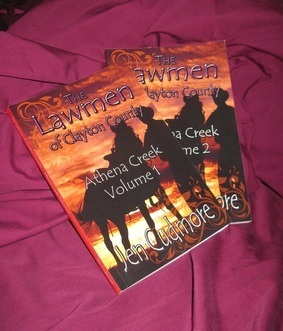 ©2013 Jen Cudmore
©2013 Jen Cudmore Jen's favorite novels all contain historical settings. She first started her own manuscripts in 2007 and is now a published historical romance author. The rest of the Lawmen of Clayton County stories will be released later this year. www.jencudmore.com
Published on August 01, 2013 03:58
July 27, 2013
A Comment on Mhets Sorrowbringer
Maybe not so much a comment as a discussion.
So far, "The Lonely Man: The Witch's Price" has been received with varying results. Some readers loved the book, others were "Not sure." While this runs from the solid to the ambiguous, I can't help but wonder what it is about the story that appeals to some people and disagrees with others.
Now, I'm well aware that the character of my "Lonely Man" series, Mhets Sorrowbringer, isn't a typical hero. Nor is he the typical anti-hero. He probably stand more across the line toward villain. But villains, as well all know, often have their own ideas of honor. And while some of Mhets' actions are deplorable, he does these things in accordance to his own view on what is right. It can also be argued that Mhets undertook his dastardly deeds while in a mental state bordering on insanity. This by no means exempts him from vilification, but it does, in a way, give the character an excuse.
I did not set out to make Mhets a character that readers could relate to. My aim was very much in the opposite direction. I wanted him to be a man that you could feel sorry for, that would repulse you with his indifference, and that could stand as someone unique in their isolated nature. Mhets is not a kind man, his kindness having been drawn out long ago. He is not a friendly man, his friendliness having evaporated. And he is not a man for women, his days of love blackened. He is a villain. In the beginning.
I have stated that "The Witch's Price" is where the legend of Mhets Sorrowbringer begins. It is the book of origins for this man. Fictional characters change throughout their lives. This is to be expected. Whether those changes come in response to plot or person, they are destined. I feel that the important aspects of a character, or a real person for that matter, is where they end their story. Who they are when the events that mark their lives cease. Are they better or worse? This is the important element in narratives: the growth of characters.
Mhets undergoes tremendous change throughout his early life, turning him into the cold-hearted character we see in "The Witch's Price." And perhaps it is this first glimpse of the character that puts readers off. I didn't exactly spoon-feed or sugar-coat his atrocities. I gave them up straight and blunt, with all the eloquence you'd expect from a man like Mhets. Perhaps they weren't easy to digest.
I truly enjoyed the perspective of one reviewer who said, "[Mhets] seeks redemption, not because he feels he did something wrong, but in order to avoid a jinx that is explained at the beginning of the book. This reason does not speak to his conscience, but rather to his shallowness." This is a perfect definition of Mhets Sorrowbringer. He's an extremely selfish character who's silenced his conscience--or had his conscience silenced through heartbreak. This is a man at his lowest, both morally and emotionally. He cares little for anyone, even himself, with his selfishness stemming from a desire to spite the gods rather than a personal want. And that is who I wanted readers to see.
This is very obviously a character that is hard to get behind, hard to cheer for. But my intent with this book was give Mhets his say. Maybe he was wrong for what he did. Maybe there was something inevitable about the course of his life. It's up to the reader to link events, and to explain to themselves whether Mhets is redeemable as a hero or damned for his villainy.
"The Lonely Man: The Witch's Price" is a dark and gritty story about a man whose life has been a trial of hardship. There's no way around that. Reviewers have either embraced that aspect of the story, or have hated it. Personally (and totally biased) I enjoy the character of Mhets Sorrowbringer. He has little regard for life, or for doing what's right. This isn't a YA novel where the main character is a goody goody. It's not some sprawling epic fantasy where the hero is of good heart and always saves the innocents. This is a dark fantasy, a sword and sorcery novel about a man who give no fucks about his actions or about his words. It is a novel about an uncommon character put in a harrowing position who does what he wants to do. Mhets Sorrowbringer can be a grand bastard, and he wouldn't think about apologizing for it. But he is also a man, and there is goodness in his heart, a light that has been strangled and buried and forgotten. But there is goodness there, waiting for its moment to sprout.
So far, "The Lonely Man: The Witch's Price" has been received with varying results. Some readers loved the book, others were "Not sure." While this runs from the solid to the ambiguous, I can't help but wonder what it is about the story that appeals to some people and disagrees with others.
Now, I'm well aware that the character of my "Lonely Man" series, Mhets Sorrowbringer, isn't a typical hero. Nor is he the typical anti-hero. He probably stand more across the line toward villain. But villains, as well all know, often have their own ideas of honor. And while some of Mhets' actions are deplorable, he does these things in accordance to his own view on what is right. It can also be argued that Mhets undertook his dastardly deeds while in a mental state bordering on insanity. This by no means exempts him from vilification, but it does, in a way, give the character an excuse.
I did not set out to make Mhets a character that readers could relate to. My aim was very much in the opposite direction. I wanted him to be a man that you could feel sorry for, that would repulse you with his indifference, and that could stand as someone unique in their isolated nature. Mhets is not a kind man, his kindness having been drawn out long ago. He is not a friendly man, his friendliness having evaporated. And he is not a man for women, his days of love blackened. He is a villain. In the beginning.
I have stated that "The Witch's Price" is where the legend of Mhets Sorrowbringer begins. It is the book of origins for this man. Fictional characters change throughout their lives. This is to be expected. Whether those changes come in response to plot or person, they are destined. I feel that the important aspects of a character, or a real person for that matter, is where they end their story. Who they are when the events that mark their lives cease. Are they better or worse? This is the important element in narratives: the growth of characters.
Mhets undergoes tremendous change throughout his early life, turning him into the cold-hearted character we see in "The Witch's Price." And perhaps it is this first glimpse of the character that puts readers off. I didn't exactly spoon-feed or sugar-coat his atrocities. I gave them up straight and blunt, with all the eloquence you'd expect from a man like Mhets. Perhaps they weren't easy to digest.
I truly enjoyed the perspective of one reviewer who said, "[Mhets] seeks redemption, not because he feels he did something wrong, but in order to avoid a jinx that is explained at the beginning of the book. This reason does not speak to his conscience, but rather to his shallowness." This is a perfect definition of Mhets Sorrowbringer. He's an extremely selfish character who's silenced his conscience--or had his conscience silenced through heartbreak. This is a man at his lowest, both morally and emotionally. He cares little for anyone, even himself, with his selfishness stemming from a desire to spite the gods rather than a personal want. And that is who I wanted readers to see.
This is very obviously a character that is hard to get behind, hard to cheer for. But my intent with this book was give Mhets his say. Maybe he was wrong for what he did. Maybe there was something inevitable about the course of his life. It's up to the reader to link events, and to explain to themselves whether Mhets is redeemable as a hero or damned for his villainy.
"The Lonely Man: The Witch's Price" is a dark and gritty story about a man whose life has been a trial of hardship. There's no way around that. Reviewers have either embraced that aspect of the story, or have hated it. Personally (and totally biased) I enjoy the character of Mhets Sorrowbringer. He has little regard for life, or for doing what's right. This isn't a YA novel where the main character is a goody goody. It's not some sprawling epic fantasy where the hero is of good heart and always saves the innocents. This is a dark fantasy, a sword and sorcery novel about a man who give no fucks about his actions or about his words. It is a novel about an uncommon character put in a harrowing position who does what he wants to do. Mhets Sorrowbringer can be a grand bastard, and he wouldn't think about apologizing for it. But he is also a man, and there is goodness in his heart, a light that has been strangled and buried and forgotten. But there is goodness there, waiting for its moment to sprout.
Published on July 27, 2013 15:35



